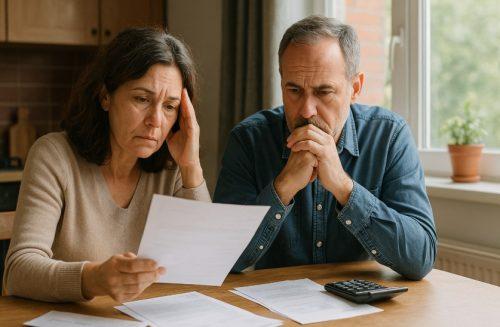|
Getting your Trinity Audio player ready...
|
You may have recently come across online posts or messages claiming that the UK government is issuing a new £450 cost of living payment in October 2025. With rising bills and ongoing financial pressure, such news can easily spark hope or confusion. But is this payment real or just another internet rumour?
While the government did issue several cost of living payments between 2022 and 2024, those schemes have now concluded. At present, there is no official confirmation of a new £450 payment. This article is designed to provide you with clear and verified information, helping you separate fact from fiction.
We’ll explore the origin of the claim, whether any real payments are planned, what genuine support is available in 2025, and how to stay safe from misinformation. Read on to get the full picture before acting on any message or headline.
What is the £450 Cost of Living Payment Claim All About?

The talk about a new £450 cost of living payment has spread widely across social media, forums, and low-authority websites. Many posts suggest the UK government is giving this payment to help struggling households in October 2025. These claims are often unverified, misleading, or entirely false.
The rumour began when blog-style sites and social media accounts started mentioning an upcoming £450 support payment, without linking to any government updates or announcements. In many cases, people are mixing up older cost of living payments made between 2022 and 2024 with new, unfounded ones.
Here’s what most of the online claims state:
- A £450 payment is coming in October 2025
- The Department for Work and Pensions is handling the rollout
- Anyone on Universal Credit or other benefits will get it automatically
- No application is required
- Messages will be sent to confirm eligibility
However, these details have no basis in current UK government policy. No credible official source or legislation has outlined such a scheme. In short, the £450 payment claim appears to be a mix of misinformation, outdated knowledge, and viral speculation.
It’s important to verify such financial announcements only through trusted government portals. The spread of these false claims may also create confusion or vulnerability for people looking for genuine support.
Is the Government Giving a £450 Cost of Living Payment in 2025?
As of the latest updates, there is no official £450 cost of living payment scheduled for 2025. The UK government previously issued cost of living payments during the pandemic recovery period, covering benefit claimants and low-income households between 2022 and early 2024. But these schemes have since ended.
According to the government’s current stance, there are no further cost of living payments planned for 2025. This has been made clear in the most recent policy updates and budget statements. The Department for Work and Pensions has also confirmed that no such payment is scheduled.
Here’s a breakdown of the facts:
- No confirmed or planned £450 payment for autumn 2025
- Final official cost of living payments were made in early 2024
- The government has explicitly stated that the scheme has concluded
- No recent Budget or Welfare Bill has introduced new one-off payments
Although there are other forms of targeted support available (explained later), there is no nationwide financial assistance programme matching this specific £450 claim.
This is why checking government announcements and avoiding unsupported claims is essential. Unless future announcements are made during official budget sessions, the idea of a £450 cost of living payment in 2025 remains a false or speculative narrative not backed by any policy or legislation.
Why Are People Believing in the £450 Payment?
The popularity of the £450 cost of living payment rumour can be linked to several factors, including misinformation, confusion, and desperation. With many UK households still under financial strain, it’s understandable that any claim about financial help spreads quickly.
One of the primary reasons people believe this is due to how closely it mirrors past genuine schemes. Between 2022 and 2024, the government issued cost of living payments totalling up to £900 for eligible households. Many people assume the payments are still ongoing.
Other reasons the rumour feels real:
- Social media posts often mimic government-style announcements
- Unverified websites publish clickbait headlines about new payments
- Scammers are using fake news to trick users into giving personal or bank details
- Outdated information continues to circulate from older blogs or pages
Additionally, some local councils are issuing targeted support payments, such as small grants from the Household Support Fund. These legitimate local schemes often get confused with national policies, fuelling further misunderstanding.
Also, in times of high energy bills and inflation, any mention of government help is quickly believed, especially when people are looking for immediate answers.
The rise of AI-generated content and unmonitored social posts makes it even easier for false information to look convincing. So always stay cautious and informed.
What Genuine Support Is Available in Autumn 2025?

Although there is no nationwide £450 cost of living payment planned for 2025, there are still several legitimate financial support schemes available to eligible UK residents this autumn. These programmes aim to assist with essential costs such as energy bills, food, and housing.
1. Energy Bill Support (e.g., Warm Home Discount)
One of the most well-known and reliable schemes is the Warm Home Discount, which continues in 2025. Eligible households can receive a one-off £150 discount on their electricity bill. This support is usually provided automatically by energy suppliers if you meet the qualifying criteria.
Key points:
- Discount is applied directly to your bill, not paid as cash
- Available to people on Pension Credit or low-income benefits
- Delivered through participating energy suppliers
2. Local Council Help Through Discretionary Funds
Many councils across the UK are still offering targeted support using discretionary funds from the Household Support Fund. These payments are typically smaller but aimed at helping with urgent needs like food, heating, or rent.
Examples include:
- One-off grants between £50 and £130
- Food vouchers for families with children
- Emergency payments during cold weather
The exact support varies by local council, so checking your local authority’s website is essential.
3. Seasonal or Household-specific Schemes
In addition to the above, you might be eligible for:
- Budgeting advances if you’re receiving Universal Credit
- Cold Weather Payments triggered during extreme conditions
- Free school meals or holiday vouchers for children
| Scheme | Support Type | Amount | Eligibility |
| Warm Home Discount | Energy bill discount | £150 | Low income or Pension Credit |
| Household Support Fund | Local cash or vouchers | £50 – £130 | Varies by council |
| Budgeting Advance | Loan | Varies | Universal Credit recipients |
| Cold Weather Payment | Heating support | £25/week | Low-income + weather trigger |
While there’s no £450 grant, these real and accessible options provide crucial help to many households.
What Should You Do If You’re Contacted About a £450 Payment?
If you’ve received a text, email, or message claiming you’re eligible for a £450 cost of living payment, it’s important to proceed with caution. Many such messages are scams or phishing attempts aiming to steal your personal information.
These messages often appear official and may mention the Department for Work and Pensions or use fake government logos. However, the government does not request personal or banking details via unsolicited messages.
Here’s what you should do:
- Do not click on any links or open attachments
- Never provide your bank or National Insurance details
- Check for spelling mistakes or suspicious website URLs
- Block and report the sender immediately
- Contact your bank if you’ve already given any sensitive info
Real government support is either applied automatically or requires login through secure official platforms. If you ever have doubts, use trusted channels to verify the information. Protecting yourself from scams not only saves your personal data but also helps stop the spread of misinformation in your community.
How Can You Check If You’re Eligible for Any Support?

Knowing whether you’re eligible for current financial support in 2025 is crucial, especially when many rumours are spreading. Fortunately, there are clear and secure ways to check your status without relying on third-party information.
You should start by visiting the official websites of your local council or national benefits services. These platforms offer tools where you can enter your details to see if you qualify for support.
Here are a few safe ways to check:
- Use benefit calculators to see eligibility
- Check for letters or updates from existing benefit providers
- Log in to official benefit portals to check messages
- Review eligibility criteria for schemes like the Warm Home Discount or Budgeting Advances
If you’re receiving benefits such as Universal Credit, Pension Credit, or certain tax credits, you may already qualify for extra help. Always make sure to update your personal details so you don’t miss communications. By sticking to verified sources, you ensure you only get accurate and up-to-date information about financial support.
Could a New Payment Be Announced Later in 2025?
Although there is no confirmed £450 cost of living payment as of now, it’s still possible that future announcements could introduce new forms of support. The government’s policy on financial aid often evolves in response to economic conditions and public pressure.
The Autumn Budget, scheduled for late November 2025, could be an opportunity for new announcements. However, any new support scheme would be officially published, not leaked through social media or blogs.
Here’s what to keep in mind:
- Budget announcements can bring changes to welfare policy
- Any new payment would be detailed in official channels
- Support may come in different forms, not as a single cash payment
If a new payment is introduced, you’ll hear about it from trustworthy sources first. Staying informed means regularly checking updates around budget time and monitoring benefit platform messages.
While it’s unlikely, the possibility of future support depends on economic and political developments, so it’s worth keeping an eye on upcoming announcements.
Conclusion
The rumour surrounding a £450 cost of living payment in 2025 is not grounded in any official UK government policy. While previous payments were real and helpful, the current claims circulating online have no basis in fact.
Instead, there are other targeted support options you may be eligible for, such as the Warm Home Discount and local council schemes. Being informed is the best defence against misinformation and scams. Always verify any claims about financial support with reliable sources and stay updated on government announcements.
If any new schemes are introduced later in the year, they will be officially communicated through proper channels. In the meantime, use the support that is genuinely available and spread awareness about misleading claims. Knowing the truth helps not only you but also those in your community who may fall for false information in difficult times.
FAQs
Is the £450 cost of living payment a scam?
Yes, the claim is false and not backed by any official government announcement. It may also be part of a scam to collect personal information.
When did the real cost of living payments end?
The last official cost of living payments were made in early 2024. No further national payments have been planned since then.
What other types of support are available in 2025?
You may be eligible for help through schemes like the Warm Home Discount or local council grants. These support programmes vary by location and benefits.
How do I know if I’m eligible for help this autumn?
Check your benefit status using official government portals or local authority websites. Tools like benefit calculators can also provide accurate information.
Are there any one-off payments planned later this year?
Currently, no national one-off payments have been announced. Future support could be introduced during the Autumn Budget in November 2025.
Can councils offer cost of living help?
Yes, many councils provide discretionary support using local funds. This includes food vouchers, heating grants, and emergency aid for those in need.
What’s the safest way to get information about support?
Always rely on official government websites or direct communication from benefit agencies. Avoid clicking on links from unknown or unverified sources.








